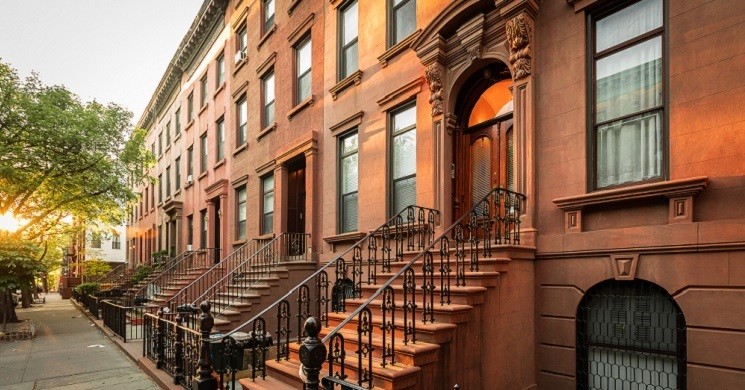New York City is a thriving cultural epicenter, where music, art and film flourish. Dreamers, hopefuls and potential transplants forever traverse to the city to have their own New York minute.
Whether you’ve been paying NYC rent and are now ready to make the step to buy or are entirely new to the city, New York City’s real estate housing market offers first-time homeowners and first-time buyers in NYC a unique opportunity and buying experience.
Although prospective homebuyers in New York can face competition, bidding wars are not as intense as they’ve been in the past. Buying your first home in the city may require a large amount of cash, but once you sign the papers, you will own a home in the most-populous city in the United States.
You’ll want to understand the nuances of buying in NYC as you begin your search for a new home.
First things first
If you’re taking the first steps to buying a home in NYC, familiarize yourself with the five boroughs of New York. As an urban dweller, you’ll want to know the ins and outs of whichever neighborhood you decide to call home. The five boroughs—the Bronx, Brooklyn, Manhattan, Queens and Staten Island—all offer an array of neighborhoods with their own vibes and advantages.
Location is a crucial decision for any buyer, and NYC offers a plethora of choices. Ask yourself:
- Do you care about living by parks?
- Do you need to live close to quality schools?
- Do you want a trendy neighborhood close to work?
- Do you care about access to nightlife, stores and restaurants?
- What do you want your commute to look like? Should it be walkable? Or is public transit okay?
Once you’ve zeroed in on your preferred borough and neighborhood, find a real estate agent who is very familiar with the area and its properties. A knowledgeable agent can give you a huge advantage in the buying process.
Prepare for the costs
Familiarize yourself with costs before you get serious about your home search. NYC real estate taxes levied on homebuyers aren’t common in other cities. For example, all buyers in New York state must pay a 1% mansion tax on homes costing $1 million or more. Properties sold in New York City costing $2 million or more, however, have an increased mansion tax. This incremental tax is between 0.25% and 2.9% depending on the purchase price. The good news for buyers? Lenders typically cover 0.25% of the mortgage tax. Also, co-ops are not required to pay this mortgage tax, so the lower costs associated with co-ops could be a budget-friendly option for some.
Estimating your costs in advance is essential. Save up and get preapproved or prequalified for a specific loan amount before you start shopping for a home. Keep in mind that many sellers today do not allow mortgage contingencies in the sales contract, meaning your deposit is at risk if you’re not approved by a bank.
Compare condos with co-ops
A key decision you will likely have to make once you start home hunting in New York is whether to get a co-op or a condo. You'll want to know the several key differences between the two.
Co-ops. Co-ops are governed by a board of directors. The board must approve all buyers and make other executive decisions, such as authorizing renovations and determining whether to allow rentals, often making the co-op purchasing process longer than that for condos. Co-op boards will want to see a buyer’s financial records, employment history and other personal records before approving the purchase. Co-ops can also enforce other rules, such as requiring that buyers make a down payment of more than 20%.
Condos. Condos mean you have full ownership of the apartment and some part of the building’s common areas (e.g., the gym). Condo buildings have a board, but the boards are less involved than a co-op board.
| Co-op | Condo | |
| Pros |
|
|
| Cons |
|
|
Know the difference between warrantable and nonwarrantable
When buying either a condo or co-op, it’s important to know the difference between the terms “warrantable” and “nonwarrantable.” Warrantable buildings are those in which 51% or more of the units are owner-occupied, no more than 10% is owned by one person or entity and less than 20% of the square footage is used for commercial space. Warrantable buildings are deemed to have more price stability because many of the units have already been sold. Some lenders won’t lend to buyers in nonwarrantable buildings because of concerns over price instability until those buildings receive warrantable status. Banks being less willing to lend can also make selling a condo or co-op in a nonwarrantable building tough, as well as affect the future value of the condo or co-op.
Keep in mind, however, that many warrantable buildings were once non-warrantable, and buying a condo or co-op in a nonwarrantable building that eventually becomes warrantable could be a savvy financial decision. Nonwarrantable buildings are also generally newer constructions, which may be appealing to buyers who want more updated features and less initial maintenance.
Build a homebuying support team
When tackling the NYC real estate market, being financially prepared is essential. Your Relationship Manager can guide you through the financial evaluation and preapproval or prequalifying steps, including helping assess your debt-to-income ratio, credit score, post-loan liquidity and other factors that could affect the buying process. Additionally, your Relationship Manager can help make sure you’re prepared to move forward when your dream home comes along.
This information is governed by our Terms and Conditions of Use.




